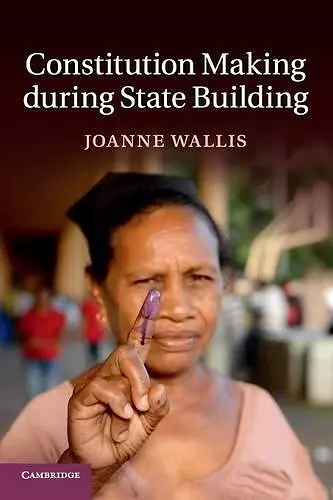Constitution Making during State Building
Format:Paperback
Publisher:Cambridge University Press
Published:4th Aug '16
Currently unavailable, and unfortunately no date known when it will be back
This paperback is available in another edition too:
- Hardback£110.00was £110.00(9781107064713)

This book argues that fragmented, divided societies that aren't immediately compatible with centralised statehood can best adjust by emphasising the role of constitution making.
This book argues that fragmented and divided societies that are not immediately compatible with centralised statehood can best adjust to state structures by emphasising the role of constitution making. It is the first attempt to conduct a detailed empirical study of the role played by the liberal-local-hybrid approach in state building.How can fragmented, divided societies that are not immediately compatible with centralised statehood best adjust to state structures? This book employs both comparative constitutional law and comparative politics, as it proposes the idea of a 'constituent process', whereby public participation in constitution making plays a positive role in state building. This can help to foster a sense of political community and produce a constitution that enhances the legitimacy and effectiveness of state institutions because a liberal-local hybrid can emerge to balance international liberal practices with local customary ones. This book represents a sustained attempt to examine the role that public participation has played during state building and the consequences it has had for the performance of the state. It is also the first attempt to conduct a detailed empirical study of the role played by the liberal-local-hybrid approach in state building.
'Joanne Wallis has made an extraordinary contribution to our understanding of the constituent process in twenty-first-century state-building. Based on empirically grounded studies of constitution-making processes in Timor-Leste and Bougainville, Wallis uses a comparative historical method to explore how public participation in constitution-making processes may assist state-building in deeply divided societies. Wallis persuasively argues that the effectiveness of new state institutions is linked to the success in achieving a liberal-local hybridity through popular participation. Her contextually rich analysis is a must-read for lawyers, political scientists, and policy makers around the world who are confronted with the failure of state institutions that were imposed or inherited in the postcolonial and World War II era.' Heinz Klug, Evjue-Bascom Professor of Law and Director of the Global Legal Studies Center, University of Wisconsin Law School
'One of the signal successes of [Wallis's] book is her thorough and wide-ranging survey of the literature on the topic. Moreover, she draws from the survey an extensive and detailed menu for constitutional planning committees on how best to go about creating a process that includes broad representation and that shows due respect for all segments of the new state.' Jean G. Zorn, Pacific Affairs
ISBN: 9781107666658
Dimensions: 228mm x 152mm x 22mm
Weight: 610g
420 pages